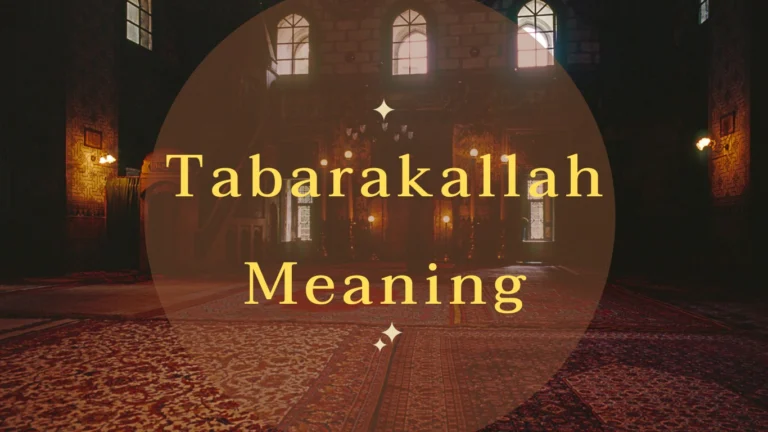In the rich tapestry of Islamic culture, certain phrases carry profound meanings and deep spiritual resonance. Among them, Tabarakallah and Mashallah stand out as expressions of reverence and admiration. These phrases are often used by Muslims to acknowledge the beauty and magnificence of Allah’s creations. But what do these words truly mean, and how should they be used? In this blog post, we’ll explore the meanings, usage, and significance of Tabarakallah and Mashallah, providing insights for anyone keen to understand these beautiful expressions better.
What is the Meaning of Tabarakallah?
At its core, Tabarakallah is a phrase that signifies the blessings and magnificence of Allah. The word “Tabarak” originates from the Arabic root word “Barakah,” which means blessing. When combined with “Allah,” it translates to “Blessed is Allah.” This phrase is often used to show astonishment or appreciation for something extraordinary in the world, acknowledging that it is a manifestation of Allah’s blessings.
Tabarakallah Meaning in Urdu
In Urdu, Tabarakallah retains its original Arabic essence. The term is used to express admiration and gratitude for Allah’s blessings. It’s similar to how one might say “Subhanallah” when marvelling at something beautiful or awe-inspiring. Many Urdu-speaking Muslims use this phrase in their daily lives to acknowledge and appreciate the wonders of Allah’s creation.
Tabarakallah Meaning in English
When translated to English, Tabarakallah means “Blessed is Allah.” This phrase reflects a deep sense of reverence and acknowledgment of Allah’s supreme power and blessings. It’s a way for Muslims to express their appreciation for something beautiful or extraordinary, attributing it to Allah’s will.
Tabarakallah in Arabic
In Arabic, Tabarakallah is written as:
تَبَارَكَ اللَّهُ
This script is often displayed in calligraphy and art, symbolizing its spiritual and cultural significance.
Tabarakallah Reply
When someone says Tabarakallah, the appropriate response is usually “Jazakallah Khair” (May Allah reward you with good) or “Ameen” (Amen). These responses acknowledge the sentiment expressed and reciprocate with a prayer for blessings.
Mashallah and Tabarakallah
While Tabarakallah means “Blessed is Allah,” Mashallah translates to “What Allah has willed.” Both phrases are used to express appreciation for something beautiful or extraordinary. They are often used interchangeably, but there are subtle differences in their connotations.
Mashallah Tabarakallah Meaning
When combined, Mashallah Tabarakallah means “What Allah has willed, blessed is Allah.” This combination emphasizes both the recognition of Allah’s will and the blessings He bestows. It’s a comprehensive way to express gratitude and admiration for something remarkable.
Mashallah Tabarakallah in Arabic
In Arabic, Mashallah Tabarakallah is written as:
مَا شَاءَ اللَّهُ تَبَارَكَ اللَّهُ
This script beautifully intertwines two powerful expressions of faith and reverence.
Mashallah Tabarakallah Meaning in Urdu
In Urdu, Mashallah Tabarakallah carries the same profound meaning. It is a way to acknowledge the beauty and blessings of Allah, often used in moments of admiration and amazement.
Examples of Tabarakallah in Sentences
Understanding how to use Tabarakallah in everyday conversation can deepen your appreciation for this phrase. Here are some examples of how Muslims use Tabarakallah in sentences:
- “No better joy in this Dunya than a sweet little girl as your daughter. My daughter is THE best thing in my life, Mashallah Tabarakallah.”
- “Me, every single time I look in the mirror. Mashallah Tabarakallah.”
- “She is beautiful… Tabarakallah.”
- “Some people are fine sha. Tabarakallah.”
- “Tabarakallah Mashallah. May Allah bless your effort, give you a good husband, kids, and job.”
These examples illustrate the versatility of Tabarakallah in expressing admiration and gratitude.
Tabarakallah Use in the Qur’an
Tabarakallah is not just a phrase used in everyday conversation; it also appears in the Qur’an, underscoring its spiritual significance. Here are a few passages that feature this phrase:
- Surah Al A’raf Ayat 54:
تَبَارَكَ ٱللَّهُ رَبُّ ٱلْعَٰلَمِينَ
Tabaarakal laahu Rabbul ‘aalameen
Truly blessed is Allah, the Lord of all worlds!
- Surah Al Furqan Ayat 1:

Blessed is He who revealed the Criterion to His Servant, empowering him to be a guiding light and warning for all the worlds.
- Surah Ar Rahman Ayat 78:
تَبَـٰرَكَ ٱسْمُ رَبِّكَ ذِى ٱلْجَلَـٰلِ وَٱلْإِكْرَامِ
Tabaarak asmu Rabbika Zil-Jalaali wal-Ikraam
How wonderful is the name of your Lord, the Owner of Majesty and Honor!
Conclusion
Both Tabarakallah and Mashallah are profound expressions that allow Muslims to acknowledge and appreciate the beauty and blessings of Allah’s creation. Whether you’re marvelling at a sunset, admiring a newborn baby, or simply feeling grateful for the blessings in your life, these phrases offer a way to express that admiration and gratitude in a meaningful way.
Understanding how to use these phrases correctly can enhance your spiritual practice and deepen your connection to Islamic culture. Next time you find yourself in awe of something beautiful, remember to say Tabarakallah or Mashallah to acknowledge the blessings and will of Allah.

